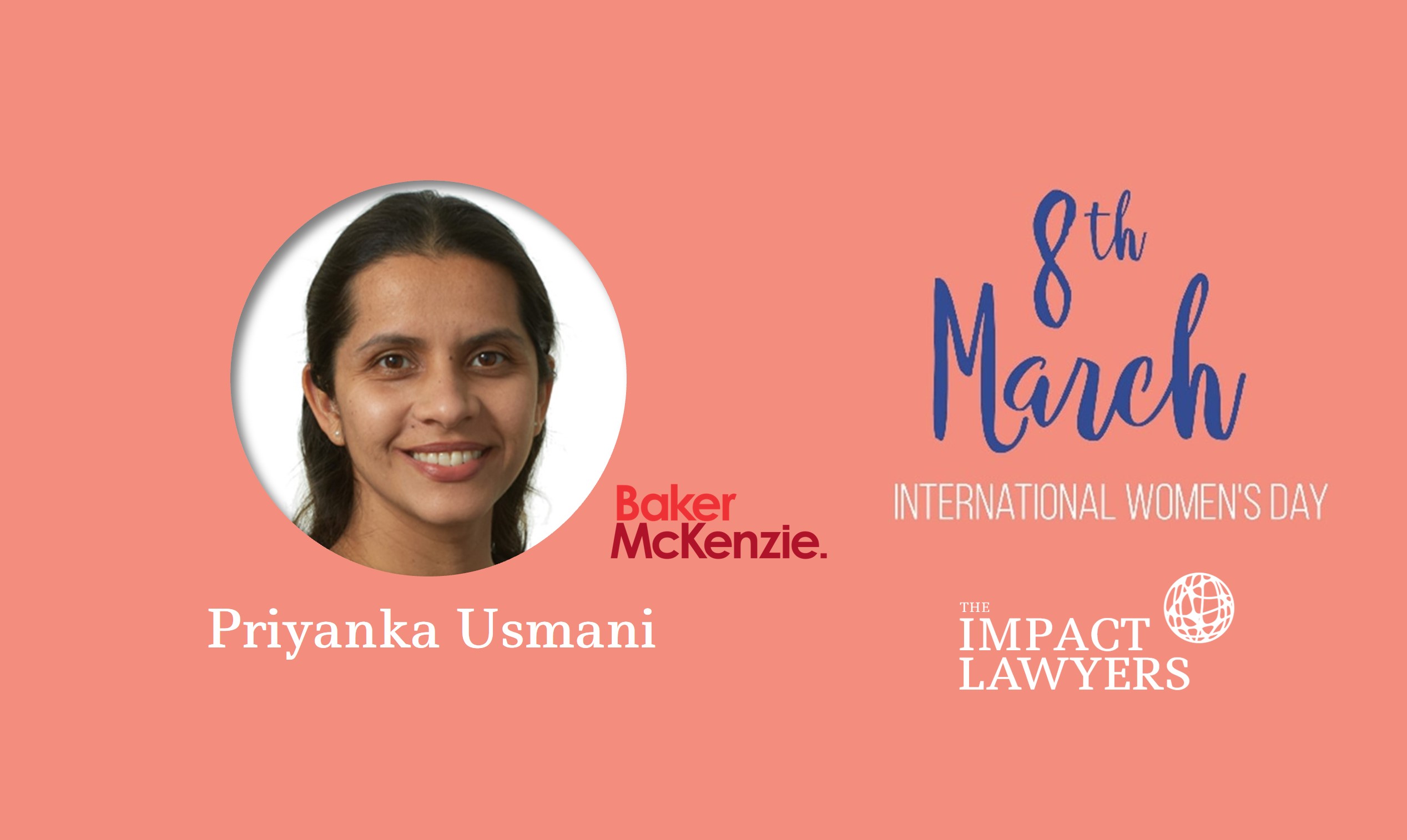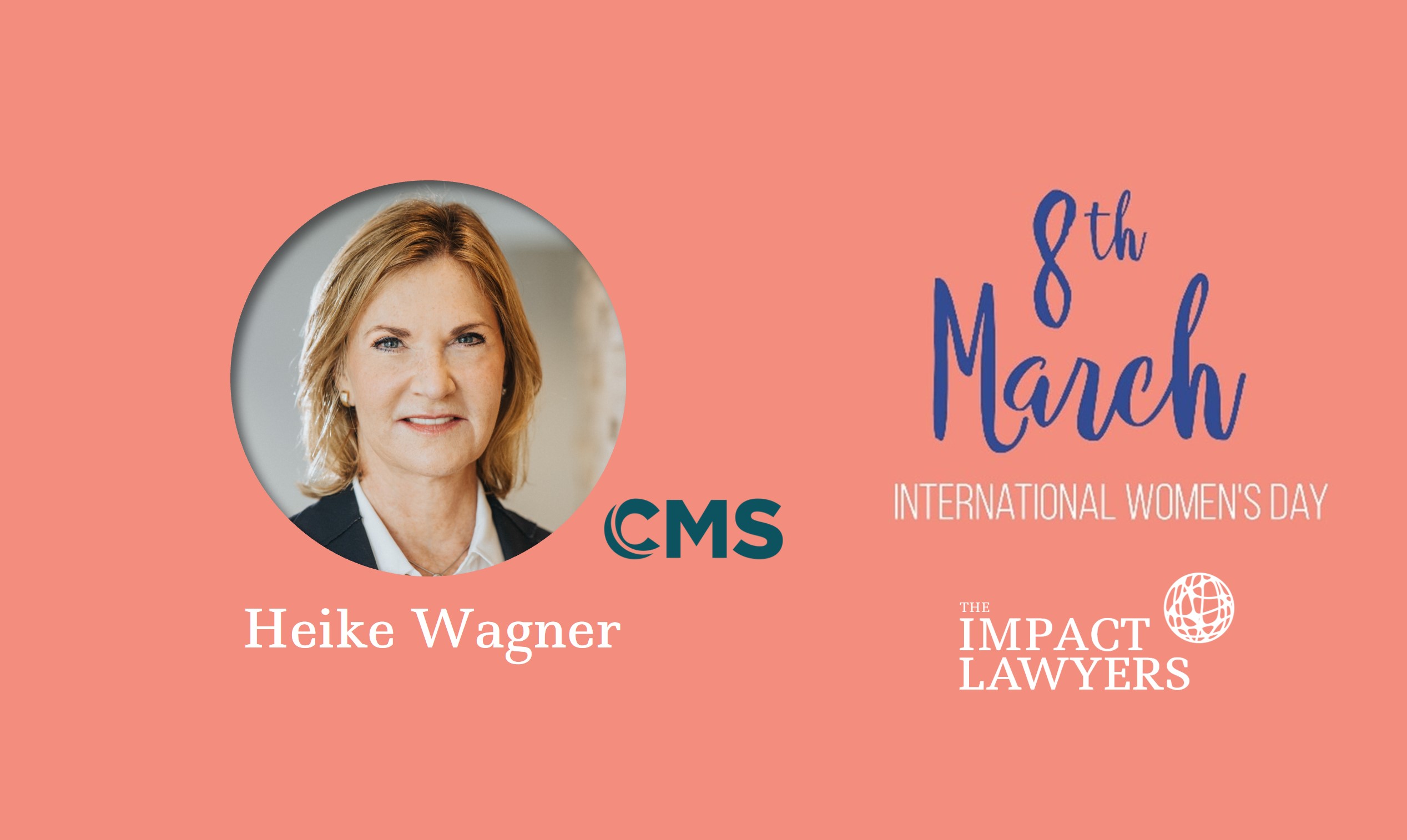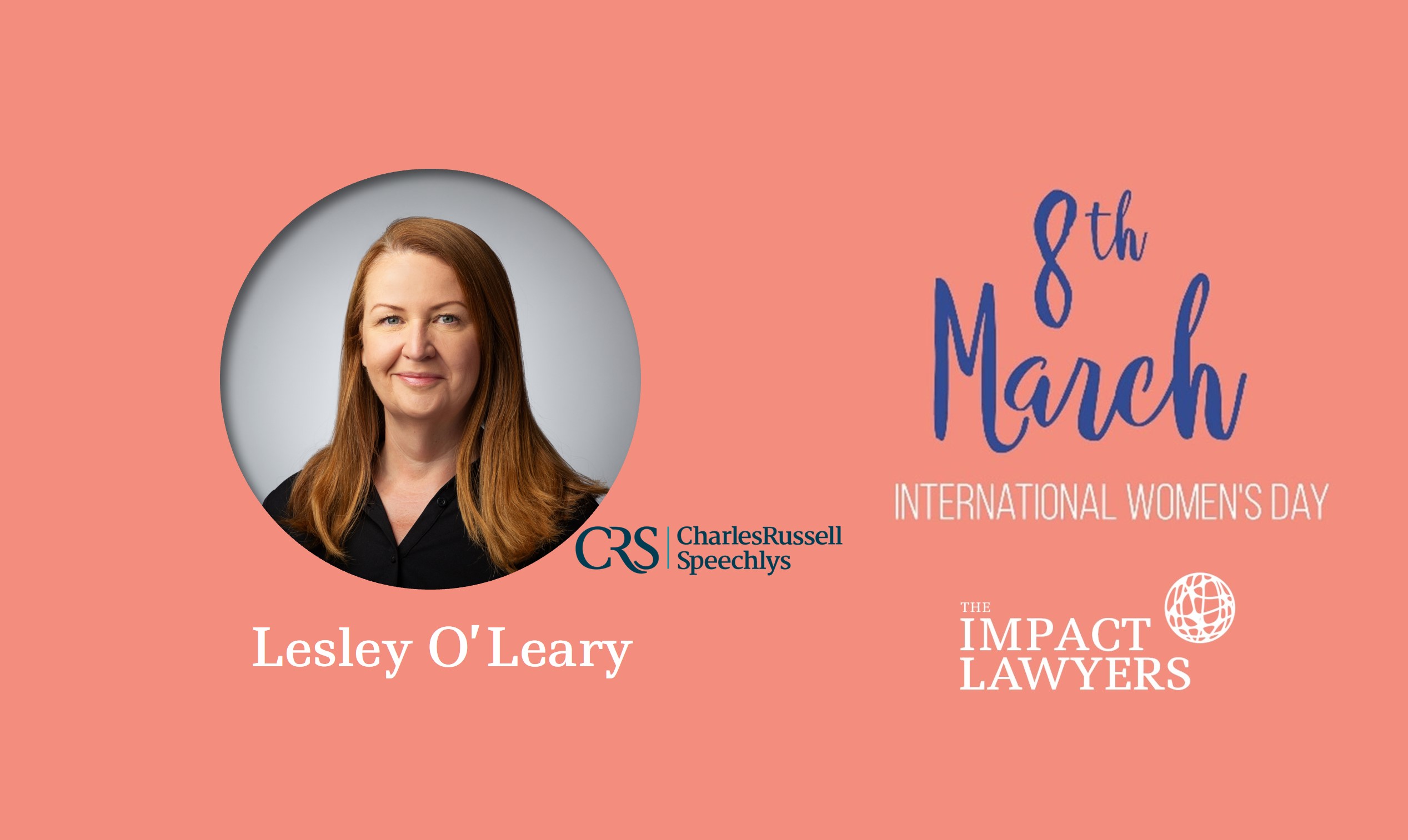IWD 2022: Women in Law
On the 8th of March every year, the whole world supports the work of women and their undoubted presence and relevance in all markets. The legal sector is no stranger to this reality, and more and more women are deciding to dedicate themselves to the legal profession with the aim of honouring this profession and providing quality service to clients.
At The Impact Lawyers we are aware that women are key to the modernisation and development of the legal profession, which is currently facing many complex challenges: digitisation, talent retention, expansion of services, among many others.
Below, we publish interviews with renowned women lawyers in the legal sector, from major global firms such as Baker McKenzie, CMS and BonelliErede.
Priyanka Usmani, Banking & Finance Partner, Baker McKenzie

Priyanka Usmani is a partner in Baker & McKenzie’s Banking & Finance Department based in London. Priyanka predominantly acts on restructuring and insolvency matters, often with multijurisdictional aspects, representing a range of clients both on the debtor side (acting for companies and financial sponsors) and on the creditor side (acting for institutional lenders and funds). Priyanka has also spent time on secondment within the restructuring team at a leading UK clearing bank.
1. What traits characterise you as a lawyer?
I am details-orientated but pride myself on being able to explain and apply complex legal principles to a wide range of clients in a clear, concise and commercial manner. I have a naturally collaborative style and I am told that I am an excellent team leader who is inclusive, empathetic and patient.
2. What are the most important challenges facing a woman who wants to have a career in a law firm?
In my view, the biggest challenges faced by women wanting to have a career in a law firm are:
- the impact having an extended period away from work when having children can have on building the strong business relationships - internally and externally - required to progress. This is exacerbated by women still - by and large - shouldering the bulk of childcare responsibilities even when they are back at work
- the relatively low number of senior female mentors and role models.
- law firms not always providing alternative career progression options and still seeing progression up to partnership as the only way to be "successful" at a law firm.
3. Do you think that the situation of women in the legal profession has improved in recent years?
Yes, I think there has been a recognition of the challenges of the types I've noted above and law firms are trying to address these. The increased number of women partners who have been appointed as Senior Partners / Chairs of global law firms in the last two-three years show that there can be roles at the highest levels for women partners.
4. And if so, do you think there is still room for improvement?
Indeed. Whilst there have been some high-profile appointments of senior women, on a day-to-day basis there continues to be dissatisfaction amongst women lawyers, particularly those within transactional teams. This often appears to be down to the lack of work/life balance and inability to progress meaningfully within law firms while also playing a central part in family life.
5. How do you think the legal profession has improved since many women have started a career in the legal profession?
There have been improvements not least because the types of issues and challenges I've noted are now being discussed openly within law firms, and management at the top level seem to be focused on addressing these challenges. There are numerous diversity initiatives within the profession and many organisations specifically set up to support and guide women in their career.
While improvements can definitely be made in the areas I've noted at (2) above, there are steps such as encouragement of shared parental leave, as well as some alternative paths to partnership which have improved the situation.
6. Is equality becoming as relevant an issue in law firms as, for example, sustainable policies or digital transformation?
I do believe that equality is an important, topical and relevant issue for law firms.
In my view, this is because of two key reasons:
(i) there is pressure from clients of law firms to see evidence of measures taken by their legal advisors to address equality, and clients seek to hold law firms to account.
(ii) there is also an increased focus on a firm's initiatives in this regard by graduates / new recruits which means that firms need to address these in order to recruit and retain talent.
Dr Heike Wagner, Partner, CMS, Rechtsanwältin; Chair of the CMS Council

1. What traits characterise you as a lawyer?
I am instinctively curious. I find law fascinating and am genuinely interested in the business of my clients. For every organisation I work with, I like to get completely involved, understanding their needs and working closely with them to provide quality counsel.
2. What are the most important challenges facing a woman who wants to have a career in a law firm?
It is important to be self-confident, back your decision-making and trust that you are as good as anybody else. It is too easy to fall into the trap of thinking others with similar experience know more than you, an attitude that can really hold you back.
Like in all professional careers you need a wider network amongst your friends and family to help guide you. Ultimately, our work is unpredictable and requires us to be available at unusual times in the day. You need those around you to understand this.
3. Do you think that the situation of women in the legal profession has improved in recent years?
It has improved significantly, in particular for women with children. The introduction of part-time work, flexible maternity leave and remote working have all been major developments.
The industry has also responded to wider society’s push towards greater equality – with our clients demanding a more representative team.
Both of these elements have helped increase the number of female lawyers making partners and female partners in management positions within law firms.
4. And if so, do you think there is still room for improvement?
There is always room for improvement, in particular we need more female partners in management positions at law firms. Ultimately for women with children, their priorities have to be client work and their families. This can make it more challenging to take on management positions, which can be both time consuming and under rewarded.
In terms of fixing this, mentoring programmes for women can help. Quotas might also help to a certain extent for these roles, but more importantly, we need continued pressure from wider society to break down barriers.
5. How do you think the legal profession has improved since many women have started a career in the legal profession?
When I started as a lawyer more than two decades ago, many women had joined the industry, but it was considerably harder to make partner.
For example, I remember being asked why I wanted to become a partner when I had a husband, while another said he did not think clients will accept female lawyers.
Thankfully, times and perceptions have changed considerably. The number of female partners has increased within the last few years. Diversity - not only gender diversity- helps to have different views on things and improve business success.
6. Is equality becoming as relevant an issue in law firms as, for example, sustainable policies or digital transformation?
It has become at least as relevant as these issues, with our clients insisting on working with organisations with shared values of equality.
Chiara Mancini, Partner BonelliErede

1. What traits characterise you as a lawyer?
As a litigator, I need to think as strategically as I can to try to anticipate my opponents’ next moves. I am passionate and dedicated to what I do, and that certainly comes in handy when managing complex cases with tight deadlines and helps me to gain clients’ trust.
2. What are the most important challenges facing a woman who wants to have a career in a law firm?
I’d choose work-life balance: it’s a challenge for all lawyers, men and women alike, but I think it’s a bigger challenge for women. But if you’re organised, have a supportive team and an understanding family, then anything’s possible.
3. Do you think that the situation of women in the legal profession has improved in recent years?
We’ve certainly come far – but we can go even further.
More and more women have embarked on a career in law in recent years. Since 2020, more women lawyers have been admitted to the Italian bar than men. This certainly has helped and will continue to help engender diversity, particularly when it comes to leadership.
When I started practising law in 2003, most partners and senior lawyers were men. So clients were accustomed to interacting mostly with male lawyers – women in the room were inevitably the exception. Don’t get me wrong, the ratio is still in favour of men. But the number of women partners has increased over the years, and perceptions have shifted: women are increasingly viewed as credible professionals who can and do make partner and become leaders.
Female partners have done a great job in paving the way and showing different leadership styles. This sets a wonderful example for the new generation of young women lawyers, which is so important.
4. And if so, do you think there is still room for improvement?
Of course, there always is.
Achieving gender diversity in law firms is a long journey – as I’m sure it is for all businesses. But thankfully the trend continues to be that gender diversity gives a competitive edge.
Women can and need to be part of the change by reinforcing female networking and empowerment. One thing many women’s organisations do is to put younger women in contact with women in senior positions in their fields. This also allows the seniors to give back and help the younger generation continue on the path to gender equality.
Another important aspect to keep in mind is the gender pay gap. We don’t talk about it enough, but it’s statistically proven to still be the case today – and not only in the legal profession. I am proud to say that it’s not an issue at BonelliErede. But it’s undoubtedly something we need to continue working on.
5. How do you think the legal profession has improved since many women have started a career in the legal profession?
One improvement I particularly appreciate is the increased sensitivity to diversity and inclusion – something that was pretty much non-existent when I started out.
Even maternity leave was a challenge back then. And paternity leave was considered pure nonsense. I’m glad to say things have vastly improved for both. Here at BonelliErede, fathers can take paternity leave not only when their children are born but also to attend to family responsibilities (such as helping with the nursery/school run).
Remote working has also played a huge role in helping families cope with everything. It’s become clear that being in the office five days a week (or more) is not as essential as once believed. People are accountable, dedicated and capable of doing a great job and achieving their targets be they at the firm’s offices or at home.
6. Is equality becoming as relevant an issue in law firms as, for example, sustainable policies or digital transformation?
Absolutely. At BonelliErede, a D&I committee is already putting initiatives in motion. And three out of the nine members of our new board are women (two more than what our ‘pink quota’ was set at!) – that’s a key sign of how things really have changed in the legal profession.
But we know that other businesses – not just law firms – now place importance on equality too: clients increasingly ask us to include D&I policies in pitches and beauty contests.
Catia Tomasetti, Leader of BonelliErede’s Energy and Ecological Transition Focus Team

1. What traits characterise you as a lawyer?
I like to think of myself as meticulous and studious. But the trait I feel characterises me the most and that I like the most about me is my creativity. Don’t want to blow my own trumpet, but I’m pretty good at coming up with innovative solutions to tricky problems. But I obviously have to do a heck of a lot of studying to understand the ‘box’ to then be able to think outside it.
2. What are the most important challenges facing a woman who wants to have a career in a law firm?
The challenges have changed over the years. When I started out as a lawyer back in the late 1980s, the main problem I faced was credibility in terms of my technical skills. Many clients didn’t trust a female lawyer. Now, over 30 years later, clients generally put female and male lawyers on equal footing. But the issue still does rear its ugly head occasionally. The more pressing challenge these days is breaking through the glass ceiling. We women still don’t have many examples of women in leadership roles to take inspiration from, and very few are at the helm of major law firms or even head up law firm departments. So now it’s not a question of our technical credibility being questioned but our credibility as leaders.
Last, but by no means least, having a work-life balance was and continues to be a big challenge. It’s still very difficult for anyone in the legal profession to have a real work-life balance – and it’s even truer for female lawyers.
3. Do you think that the situation of women in the legal profession has improved in recent years?
Absolutely. Until the early 2000s, women were rarely made partners in major firms. And at Italian law firms at least, maternity policies were a thing of dreams and very little real support was available to new mums. But thankfully things have improved considerably over the years. BonelliErede now has numerous female partners, many of whom have children and were able to take maternity leave.
4. And if so, do you think there is still room for improvement?
There’s always room for improvement. We still have a long way to go until women in the profession can truly say they have a real work-life balance. And we definitely need to increase our efforts so that women have more flexibility, especially when their children are very young. But this issue is not just about women. I strongly believe that the next leap forward will be when fathers can have the same work-life balance as mothers.
5. How do you think the legal profession has improved since many women have started a career in the legal profession?
It’s pushed law firms to become more inclusive. Embracing diversity is a clear sign of progress and evolution – and the more diversity in leadership positions, the better it is for business. So I was thrilled when last year at BonelliErede we introduced a ‘pink quota’ to make sure there’s always at least one woman on the board. We also set up a Diversity & Inclusion Committee that I’m proud to be a member of. The committee members are a mix of men and women, be they professionals or business support staff, and our purpose is simple: promote inclusion in the firm through the various D&I projects we have in the pipeline.
6. Is equality becoming as relevant an issue in law firms as, for example, sustainable policies or digital transformation?
Yes, I really think it is. But I’d say inclusion is just as relevant as equality – perhaps even more so. Any business that fails to engender inclusivity will ultimately share the fate of dinosaurs.
Lesley O’Leary, COO at Charles Russell Speechlys

1. What traits characterise you as a member of the leadership team of a law firm?
Curious.
Driven.
Empathetic.
2. What are the most important challenges facing a woman who wants to have a career in a law firm?
Everyone has to make choices and the decisions we take are centred around our values as a person. My life was less complicated in many ways when I first set out because it was just me. I didn’t appreciate my decision making was more straightforward at that time, but after marrying and becoming a mum, life was naturally more complex. Agreeing what my non-negotiables were was harder initially because I complicated things by worrying about what others thought.
I love my work and I love being with my family. The decisions I’ve made have ensured I may enjoy a rewarding and fast-paced career, while still spending time with my family... It’s not always easy, but my husband and daughters are incredibly supportive. I couldn’t do what I do without their support. And the same is true of my colleagues, who have supported and enabled my progression.
3. Do you think that the situation of women in the legal profession has improved in recent years?
Yes, but there is always more to be done and it’s down to those at the top to ensure that the generation coming up behind them has a better experience than they did. I strongly believe in that approach and it frames how I go about my professional life.
4. And if so, do you think there is still room for improvement?
In my view, women should stop waiting to be asked. Put yourself in the shoes of your client or your colleague. Identify the challenge they are facing and suggest solutions. Sometimes we hold ourselves back and talk ourselves out of things but if you demonstrate value – however that is defined – people see that. No one wants a seat at the table because of a box-ticking exercise. Know your worth and always keep your currency high. Empower others and bring people with you. Everyone needs to be involved when it comes to change.
5. How do you think the legal profession has improved since many women have started a career in the legal profession?
The view of women in society has changed over the years and that influences the legal profession just as it does other areas of business. Successful organisations value inclusion and diversity; if that is not the case, they won’t excel. Just as many men as women have supported me on my career journey, and . I’m grateful to everyone I have worked alongside. It’s now about how I may support others as they navigate the world of work.
6. Is equality becoming as relevant an issue in law firms as, for example, sustainable policies or digital transformation?
Absolutely. It matters to our clients and it matters to our people. At Charles Russell Speechlys, we have made some progress across diversity, equality and inclusion, but know we have further to go. For example, we currently have 30% female representation in our UK Partnership, and have set a target of 35% by 2024. We’ve also established a Future Firm Group which joins up the client perspective, staff networks andthe partner perspective to inform and coordinate our overall strategy to be a diverse firm – in actions and words.
We have to ensure we are constantly evolving and improving, holding ourselves to account along the way, which will ultimately lead to a better workplace for everyone.
Related links
Main menu



